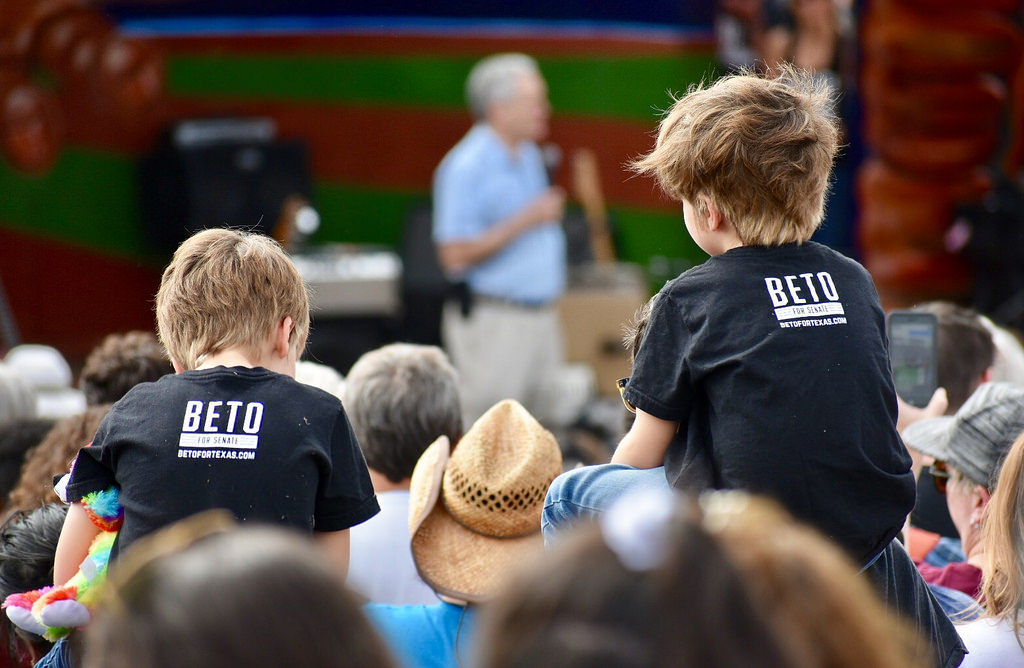At this point in the 2020 Democratic primary, most of the media attention is focused on three things: (1) polls, (2) fundraising, and (3) conflict. On the first item, the one candidate who hasn’t announced his intentions—Joe Biden—has the lead in almost every poll. But the Washington Post is tracking the accuracy of that metric.
596 DAYS TO GO:
2008 Dem: Clinton led by 10.6 points.
2008 GOP: Giuliani led by 16 points.
2012 GOP: Romney led by 8.5 points.
2016 Dem: Clinton led by 53.7 points.
2016 GOP: Walker and Bush were tied.https://t.co/OLynKLRaJh— Who led? (@LedPast) March 18, 2019
At this point in the race, polls predicted the winner of the 2012 GOP primary and the 2016 Democratic primary, otherwise they’ve been wrong. So they’re a pretty mixed bag.
One of the things to note about the fundraising primary is that, in the past, that metric was understood to indicate institutional support. But with Democrats zeroing in on support from small donors, it has become a measure of grassroots enthusiasm. Sanders was leading on that front until this news was announced on Monday.
[B]y Monday morning, O’Rourke’s campaign announced it had raised $6.1 million online in its first 24 hours, a massive amount of money that even surpasses the $5.9 million raised by Sen. Bernie Sanders in the first 24 hours of his 2020 bid. Sen. Kamala Harris had set the initial top mark of this year’s campaign with $1.5 million in her first 24 hours, still an impressive number relative to past presidential campaigns.
Reporters haven’t had much to work with when it comes to conflict between the candidates. But Will Weissart attempted to stir things up over comments made by Beto O’Rourke about how he was “born to be in” the race. Take a look at what he identified as “sharpening criticism of O’Rouke:”
Amy Klobuchar: ““No, I wasn’t born to run for office, just because growing up in the ’70s, in the middle of the country, I don’t think many people thought a girl could be president”
Pete Buttigieg: “I think I was born to make myself useful.”
Cory Booker: said that he’s dedicated his professional life to working with “communities that are really being left out and left behind.”
Kirsten Gillibrand: said she’d be more willing to fight hard for Democratic values than promote the kind of feelgood, bipartisan optimism that O’Rourke favors.
Unless you think that accusing your opponent of “feelgood, bipartisan optimism” amounts to an attack, I don’t see much sharp criticism in any of those. We’ll have to see whether that holds up as the primary intensifies.
At this point, all of the candidates are focusing on defining themselves, not attacking their opponent. Gillibrand’s comment demonstrates one of the ways candidates are distinguishing themselves at this point: as a fighter or a uniter. The senator from New York joins Warren and Sanders in identifying as a fighter. The two who stand out as uniters are Booker and O’Rourke. That has less to do with their policy differences than it does with their worldview, which is one of several items worth evaluating.
Gillibrand is attempting to redefine herself as a progressive fighter after years of taking more moderate positions, while Warren and Sanders have a history of tapping into anger at the status quo. While noting the way that “insiders” are responding to O’Rourke’s candidacy, Molly Hensley-Clancy finds the need for something very different among voters in Iowa.
In Iowa, O’Rourke rarely went deep on policy, but he did make the bones of his campaign clear. O’Rourke is betting that Democrats are hungry for bipartisanship and unity more than anything else — a gamble that cuts against conventional wisdom about Democrats in the Trump era. He is offering progressive-minded pragmatism, not left-wing revolution; relentless positivity, not fighting; and soaring oratory, not wonky specifics…
Debbie Koopman, a retired child care worker who saw O’Rourke speak in Mount Vernon, said she’d walked away from his soaring speech without much sense of his solutions for health care, a topic that he often speaks of broadly. “It’s — well, it’s health care for all,” she said. “What he’s saying is what I’ve heard before.”
But Koopman said she didn’t mind; O’Rourke was offering something else. “It’s that feel-good feeling after all the last years we’ve had and the hopelessness that so many people feel. The rampant hate that has spread has taken us down a dark road, and we want to turn towards the light and the happy — people that are for everybody.”
I can imagine a lot of eye rolling from the very serious pundits who are following this race, the same way they do in response to Booker’s relentless optimism. But it is possible that those two candidates are tapping into something that the mainstream press is over-looking. Koopman was one of several Iowa voters who contrasted the darkness and division of the Trump era with a longing for something different.
What we will find out over the course of the next few months is whether the electorate is geared up to remain angry or is ready for some hope. To the extent that there is currently a divide in the Democratic Party, that could be the root of it all. More that policy positions, those are the emotions that tend to drive elections.



